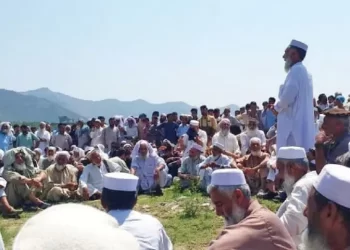Analysts believe that an expanded conflict could encourage foreign fighters to support Hezbollah and fight Israel.
The most closely watched border in the Middle East lies between Israel and Lebanon, the site of eight months of tit-for-tat attacks and a possible Israeli land assault on its northern neighbour.
Israeli officials have repeatedly threatened to intensify attacks, saying they’re necessary to defeat Hezbollah and return 90,000 Israelis evacuated from their homes in the north since fighting started in early October.
But as Israel’s rhetoric escalates, Lebanon’s Hezbollah has responded with defiance, warning that such a conflict would not only impact Israel more than it thinks, but that it would be felt regionally.
Backing Hezbollah up regionally, analysts say, is the so-called “axis of resistance”, a regional network of armed groups, backed by Iran, who have started to make their presence known since Israel launched its brutal war on Gaza.
On October 7, a Hamas-led attack on Israel killed 1,139 people and took approximately 240 captive into Gaza. Israel immediately launched an assault that has decimated Gaza. Hezbollah began engaging Israel over the border the next day, aiming to divide its focus on Gaza.
“The axis will participate in confronting any military action by Israel against Lebanon,” Kassem Kassir, an analyst close to Hezbollah, told media.
“We told them: ‘Thank you, but we are overwhelmed by the numbers we have,” Nasrallah said in the speech, adding that Hezbollah already had more than 100,000 fighters.
If Israel shifts its focus from Gaza to Lebanon, the regional calculus could change as the scope widens.
“If the United States of America continues to support this usurping entity and attacks Lebanon and attacks Hezbollah, America should know that it has made all its interests in the region and Iraq a target and a danger,” Qais al-Khazali, the leader of Asa’ib Ahl al Haq, an Iraqi member of the axis of resistance, wrote on social media on Monday.
The term “resistance” in “axis of resistance” refers to the largely Shia, pro-Iranian regional network’s opposition to the United States and Israel, which means the members could choose any number of regional targets, in addition to attacking Israel from the locations they’re based in, alone or in concert.
As Hezbollah cemented itself as a regional power and a pivot in the axis of resistance, its influence extended into Syria, Iraq and Yemen, where it coordinates logistics, operations and training with like-minded groups.
Support, but how?
“Many of the groups, especially those that are transnationally inclined in the axis, will be asked by Hezbollah leaders in different countries to help and support them,” Renad Mansour, Iraq Initiative project director at Chatham House, said.
Those groups could include parts of the Popular Mobilisation Forces (PMF) in Iraq, the Houthis in Yemen, or foreign and local fighters in Syria that have backed President Bashar al-Assad in his war against the country’s opposition.
Until now, the Houthis have mostly focused on attacking vessels in the Red Sea they deem to be connected to Israel. But should cross-border attacks by Israel and Hezbollah intensify, maritime traffic in the Mediterranean may also face disruption.
On Sunday, the Houthis and the Islamic Resistance in Iraq claimed a joint raid on four vessels in Israel’s Haifa port.
While this attack may have established a new dynamic, the two groups have coordinated for years. A Houthi representative has long been present in Baghdad, while some PMF groups have had longer, historic relationships with the Houthis, according to Mansour.
These groups will likely want to mobilise should Israel and Hezbollah’s engagement escalate.
“One prospect will be intensifying the joint attacks carried out by the IRI and Ansarullah [the Houthis] and perhaps expanding that small partnership to include more armed actors,” Tamer Badawi, an Iraq analyst focusing on politics and security, told media.
“Those attacks are likely to be incremental toward Israel corresponding to the rhythm of [Israel’s] attacks on southern Lebanon or other parts of the country.”
“If the Houthis are making it more challenging and riskier for ships to navigate to Israel through the Red Sea, targeting the ones bound to Israel via the Med[iterranean] … would apply extra pressure on Israel,” Badawi said.
Much like in the Red Sea, attacks on ships do not need to directly strike sea traffic to affect Israel, shipping companies and the global economy.
“As insurance costs increase, importing costs increase, thus adding to the economic pressure [on Israel],” Badawi added.









